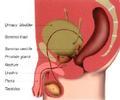
THE SCREENING TESTS
The importance of early detection of prostate cancer cannot be overemphasised. Early detection programmes encourage men to come in once per year to be screened. These programmes are advocated in populations such as ours where prostate cancer is extremely common and is therefore considered a major health problem.
The screening tests are safe, relatively pain-free and inexpensive. These tests are the digital rectal examination (DRE) and the prostate specific antigen (PSA) blood test.
The DRE involves the doctor inserting his or her gloved and lubricated finger into the rectum where the peripheral zone of the prostate can be felt. It is fortuitous that it is in this zone that 70 per cent of prostate cancers arise. The doctor feels for the consistency of the prostate which is normally similar to that of the tip of the nose. Suspicion for cancer is aroused if there is a nodule, hardening, fixation or asymmetry of the prostate gland.
In very early cases of prostate cancer there may be no abnormality of the gland that can be appreciated on rectal examination. In these cases cancer may be suspected, based on an abnormal PSA blood test. If either the DRE or the PSA is abnormal a prostate biopsy should be performed to determine whether prostate cancer is present or not. If both the DRE and PSA are normal there is no need to perform a biopsy and the man should return in one year to have these tests repeated.
A biopsy is a procedure in which tissue is obtained from a living person and is then examined by a pathologist for the presence of disease. In the presence of an abnormal DRE or PSA, a prostate biopsy is necessary to determine the presence of cancer because these abnormalities may be produced by diseases of the prostate other than cancer.
To facilitate the biopsy a trans-rectal ultrasound examination is often performed and with the live image of the prostate, a fine needle is used to guide the taking of the tissue from the prostate. The trans-rectal ultrasound uses high frequency sound waves to create an image of the prostate on a television monitor. The ultrasound instrument probe is inserted into the rectum in a pain-free manner and the examination and biopsies expeditiously performed in 10 to 15 minutes.
It is not possible for the ultrasound examination on its own, that is, without concomitant biopsies being taken, to determine whether or not cancer is present. This is partly because between 30 and 40 per cent of cancers cannot be detected on ultrasound. Ultrasound examination of the prostate should never precede a DRE and a PSA blood test. The usefulness of ultrasound in this scenario is of such limited value in diagnosing prostate cancer that it could be considered a worthless exercise.
Similarly, it is pointless having a trans-rectal ultrasound done for the purpose of diagnosing prostate cancer because of an abnormal DRE or PSA and not having the biopsies performed simultaneously. Remember, only a pathologist examining tissue from the prostate can determine whether cancer is present or not. No information that is derived from the findings on ultrasound in combination with the PSA can be used to reliably exclude cancer and therefore to decide that a biopsy is not necessary.
Dr. William D. Aiken, consultant urologist, University Hospital of the West Indies.

